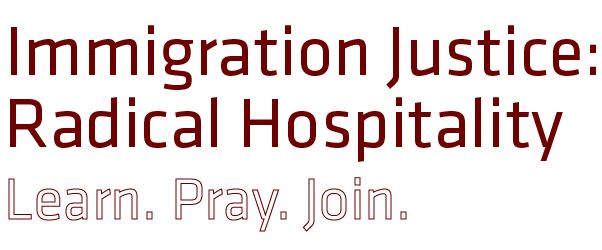This post is part of Mennonite Church USA’s Immigration Justice: Radical Hospitality Learn, Pray, Join initiative.
 Richard R. Aguirre is an administrator at Goshen College and an elder at Berkey Avenue Mennonite Fellowship. He coordinates the Goshen Mayor’s Latino Advisory Committee and is a board member of the Center for Healing & Hope, which helps immigrants and refugees through the Elkhart County HOPE Network.
Richard R. Aguirre is an administrator at Goshen College and an elder at Berkey Avenue Mennonite Fellowship. He coordinates the Goshen Mayor’s Latino Advisory Committee and is a board member of the Center for Healing & Hope, which helps immigrants and refugees through the Elkhart County HOPE Network.
_______________________
In the Parable of the Good Samaritan (Luke 10:25-37), Jesus tells the story of a man who was robbed, beaten, and left half dead on a dangerous road. A priest and a Levite ignored the man, but a Samaritan stopped, bandaged the man’s wounds and took him to safety.
Jesus didn’t explain why the priest and Levite didn’t help, but indicated they weren’t good neighbors, praised the Samaritan, and ended his lesson with a simple command: “Go and do likewise.”
This parable resonates with me because I believe people of faith have an obligation to help our neighbors, immigrants and refugees, who have suffered greatly since President Trump took office and launched a campaign to keep immigrants and refugees out of this country.
The current administration has implemented more than 400 executive actions, spanning everything from “border and interior enforcement to refugee settlement and the asylum system, Deferred Action for Childhood Arrivals (DACA), the immigration courts and vetting and visa processes,” according to the Migration Policy Institute.
As a Mexican-American, I’ve always lived among immigrants, and I know the Trump administration’s actions have made them feel afraid and unsafe. Despite their contributions, immigrants believe they’ve been abandoned by their communities and their neighbors. They doubt a divided Congress will ever create a path to legal status, and there’s growing hopelessness and despair.
Fortunately, people of faith and goodwill have responded to this crisis by providing financial assistance and shelter to immigrants and refugees in their communities and at the U.S.-Mexico border, and advocating against Trump’s unjust policies through litigation, lobbying and protests.
Goshen College, in Elkhart County (Indiana) has offered substantial help to immigrant students, including prayers, statements of solidarity, counseling, free transportation, financial assistance and leadership of a community support network. That network, Elkhart County HOPE (EC HOPE), created a resident identification card, and has provided more than $100,000 in food, medical and legal assistance to immigrants. EC HOPE even helped defeat a proposed immigration detention center near Goshen in 2018.
Yet, the challenges continue: the COVID-19 pandemic has opened new avenues for cruelty against immigrants and refugees.
Under the guise of protecting public health, the Trump administration has imposed 48 policy changes, including new travel bans, visa suspensions, an end to refugee resettlement and the rejection of all asylum applications, according to the National Immigration Forum. Without due process, administration officials have also expelled unaccompanied children seeking safety and kept adults in unhealthy detention facilities.
In addition, disproportionate numbers of Latinos, including immigrants, are contracting and dying from the virus. The Centers for Disease Control and Prevention (CDC) reports that Latinos, who make up 18% of the U.S. population, comprise more than a third of COVID-19 cases and deaths.
A similar trend has emerged in Indiana: Latinos make up 7.1% of the state’s population, but they make up 10% of Hoosiers testing positive for COVID-19. And while Latinos comprise 16.3% of Elkhart County’s population (and more than 30% in Goshen), they’ve made up as many as half of the positive cases since mid-May.
Latinos have higher rates of COVID-19 than other racial or ethnic groups because they suffer disproportionally from such chronic health conditions, such as diabetes and high blood pressure. Compared with other groups, Latinos have less access to health care and lower insurance rates and have been tested for COVID-19 at lower rates. Their jobs and work conditions often don’t allow adequate physical distancing and multigeneration and extended family living situations have made virus transmission a greater risk.
These afflictions and disadvantages are worse for immigrants, who fear any interaction with health or government officials could lead to their arrest and deportation.
Can anything be done to help?
In Elkhart County, leaders were alarmed by increasing rates of COVID-19, so they acted to help the Latino community because they recognized that our collective health as a county depended upon the health of all. In June, the Elkhart County Health Department engaged Goshen College to develop and lead the Elkhart County Latino Pandemic Response Initiative, a network of diverse Latino community leaders.
Serving as co-directors, Goshen College Dean of Students Gilberto Pérez Jr. and I have assessed the needs and concerns of Latinos, advocated for them with county and state leaders and met with church and school leaders. Members of the initiative have created and broadcast hundreds of public service announcements on three Spanish-language radio stations, produced informational videos that have been viewed hundreds of thousands of times, and posted hundreds of announcements on social media platforms. We’ve also distributed 8,500 face masks and increased COVID-19 testing rates among Latinos.
There’s more work to do, but we believe the Elkhart County Latino Pandemic Response Initiative is helping reduce COVID-19, setting the stage for future collaborative initiatives that will benefit our entire community.
Other communities have done amazing work, but I’d challenge Mennonites to do more to help immigrants and refugees stay healthy and safe. The sooner we reduce COVID-19 rates among the least of our brothers and sisters, the better off we all will be.
So, as Jesus commanded, “(Please) go and do likewise.”
We seek to join in God’s healing work regarding immigration, trusting that God goes before us and desires wholeness and well-being for all people. (from MC USA Churchwide Statement on Immigration)
You are invited to get involved with the work for Immigration Justice: Radical Hospitality as we offer resources to Learn, Pray, Join.
The views and opinions expressed in this blog belong to the author and are not intended to represent the views of the MC USA Executive Board or staff.


